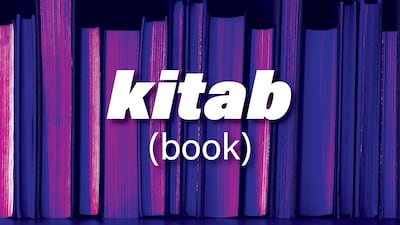Kitab, our Arabic word of the week, is the name of a simple object that has changed the world, the book.
From the scrolls of ancient Egypt and the codex of the Romans, to the Chinese’s invention of paper, and what is considered the first official printed book in The Diamond Sutra in AD 868, the book evolved over the centuries.
Kitab, or a book, is a collection of pages, inscribed with words, about one topic, or several topics within a theme, a story, a poem, a novel, bound together between a front and back cover.
Whether used to tell stories, record history or share information, the word kitab is a purely Arabic word. Its root derives from the word kataba, meaning “to write”. So it’s fair to say that the book came to be as a result of the act of writing.
The word kataba is also the source of several other words. Katib meaning writer, maktaba, which means library, and katateeb, which is a school dedicated to the studying and memorising of the Quran.

Islam and the Quran have a great historical influence on books and literature in the Arab world. To start, the word Quran derives from the word qaraʼa, meaning "he reads" and the first aya, or revelation, that came to the Prophet Muhammad from the angel Gabriel was to read.
Al Kitab, meaning “the book”, is sometimes used to reference the Quran or any holy book from the Abrahamic religions. The Quran is also considered the first Arabic book.
During the pre-Islamic period, stories, poetry and speeches were recorded and passed on orally. However, with the revelation of the Quran, many of its passages were written in tablets and scraps and eventually transcribed under Abu Bakr, the senior companion of the Prophet.
The Quran as a book and the religion of Islam had a great and lasting effect on Arabic literature, inspiring writers of prose and poetry for generations and spreading a love for the written word and for books.
Acclaimed Egyptian poet Ahmed Shawky, known as the prince of poets, wrote a poem, The Poem of the Book, in which he details his love for the book.
“I who replaced my companions with books, did not find anyone more faithful than the book,” reads the first sentence of the poem.
Shawky lovingly describes the transformative powers of books while celebrating their ability to archive the past and their diversity in tone from the serious to the humorous. He also cleverly compares books to a loyal friend and advises to choose companions as wisely as one chooses the books they read, since both have the power to influence you for better or for worse.
Scroll through the gallery below to see The National's pick of Arabic words of the week











































































